Gliding under the most demanding conditions
Stainless steel shafts, flanged and plain bearing for lab presses
The lab presses must stand up to complex time, pressure and temperature specifications for pressure tests on rubber or plastics - even under vacuum. At times, they are in almost daily use in four-shift operations. These are not off-the-shelf products, but rather customer-specific solutions. Robust stainless steel shafts and temperature-resistant and lubricant-free polymer bearings ensure the best possible uptime of the machine's centerpiece, the two press plates.
"Our lab presses are used in all aspects of rubber and plastics development and testing", explains Joachim Werner, Managing Director at Berlin-based Vogt Maschinenbau GmbH. "These could be universities and institutes, but also industrial companies. Whereas one group may for instance research the strength of interior panels from renewable materials or the stiffness of carbon fibers for the automobile industry, others conduct complex incoming inspections. These applications can require very, very long machine runtimes. The product range consists of automated, vacuum, forming, and hand-lever presses. hese can be equipped with heated and cooled press plates that can reach temperatures up to 400 °C. Press forces are as high as 70 t.
The lab presses are configured as four-column upstroke designs, which means that the piston presses upward from below. The upper counter plate, the yoke plate, absorbs the entire press force. "It is also possible to press from the other direction", explains Joachim Werner. "But our approach is more gentle, since we are working against gravity. “
Among others, the complete four-column unit includes components supplied by igus® GmbH, Cologne. Both companies have already been collaborating for many years. The components involved are corrosion and chemical-resistant stainless steel shafts and easy to assembly, maintenance-free drylin® R flanged bearings with positive fit liners made from high-temperature resistant and maintenance-free iglidur® X. Only in cases involving very large dimensions, the liner is replaced by a cylindrical bushing that is made completely from iglidur® X. The stainless steel shaft is made to customer drawing, and varies in length between 430 and 600 mm, depending on the press type. The diameters of the bearing range between 30, 40 and 50 mm.
In total, the mechanical engineering firm has been active in the market for about fifteen years and can point to a considerable know-how base. Roughly 150 projects have been completed mostly in Germany, but also internationally. "For instance, we have two lab presses in operation in Saudi-Arabia", claims Joachim Werner. "One of them is used by a company that produces urine containers on injection molding presses. This is where the aforementioned incoming inspections take place. “
A small group of employees, consisting of the Managing Director, a design-engineer, an assembler, and one office staff, are managing the generally highly complex orders. Lab rolling mills are produced in addition to lab presses. The company has minimal vertical integration. "We do not invest into machining centers, but instead farm out all relevant orders to job shops, procure our components from proven suppliers and then assemble the product at our facility", Joachim Werner reports. The lab presses are available in four different sizes, which differ in the dimensions of the press surfaces. They are designed according to customer needs. The supplier is focused on configuring and customizing the base machine to the specific customer needs. "Our customer is provided with a machine that is exactly configured for his specific application", Joachim Werner elaborates on the company's product philosophy.
A host of custom applications have been implemented with the various lab presses. For instance, the topic of form presses involves so-called "Ophthalmic Plaques". They are implanted as a long-term treatment for patients suffering from cancer of the eyeball. Weakly radiating isotopes are used in this case. The machine is used to create cup-shaped custom geometries for medical devices. The customer's task consists of executing a fixed, basic cycle to produce the radiating implants by means of pressure. A cycle of the individual cycle parameter values needs to be highly repeatable and user-programmable with up to seven individual steps. In total, 20 individual cycle programs with customized value combinations for pressure and time can be executed and reproduced.
In another application, a vacuum press is used to apply gems in a filler end-cap. The working principle is very straight-forward: The gem and the end-cap blank are inserted into the tool. The workpiece is heated, a vacuum is created and subsequently evacuated.
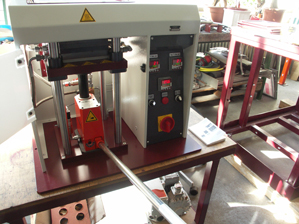
Lab press with four-column unit.
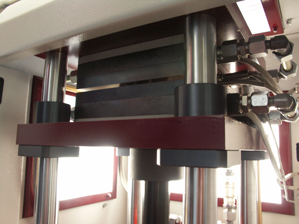
Hand-lever press: The press plates are moved by the four-column unit.
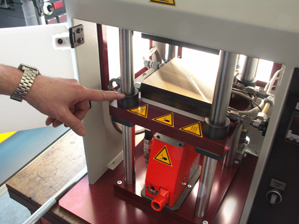
Stainless steel shaft with flange and polymer liner on the lab press.
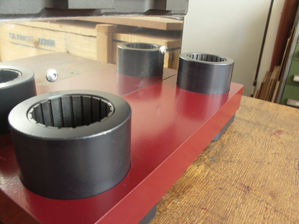
Assembled flange bearings.
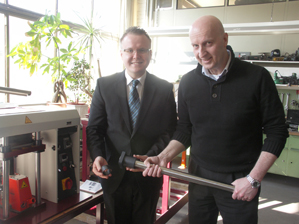
From left: Benjamin Neumann (igus® GmbH), Joachim Werner (Managing Director, Vogt Maschinenbau GmbH).
The tool closes and the upper and lower elements bond together. The end-cap with its valuable content can then be removed. One cycle requires about 30 minutes. "By now, a total of more than 500,000 end-caps have been produced without problems", reports Joachim Werner.
The polymer bearings with the robust stainless steel shafts are exclusively used in the guides of the various lab presses. The basic primary requirement is always that the press plates close. They also need to be as parallel to each other as possible. Plane-parallelism is therefore a requirement. The press function and plane parallelism is achieved with the column-guide. The column must also be able to withstand short-term temperatures of up to 300 °C. Downtimes must be kept to a minimum. "The lubricant-free polymer bearings allowed us meet this requirement", Joachim Werner explains. "The guide characteristics are up to the job - there is no maintenance to speak of. And should worse come to worse, the lubricant-free liners and bearings are easily replaced. "In summary, he concludes that the complex components have fulfilled the requirements of this mechanical engineering firm.
The polymer bearings are replacing metallic PTFR coated bushings that were originally in use. These did not prove to be effective because the coating did not stand up to the high temperatures over time, so that the bushing sooner or later seized up on the column.
iglidur® X has demonstrated its capabilities in the linear motion on the stainless steel shaft and the lifting units. The high-performance polymer is tackling pressure loads of up to 150 MPa and short-term exposure to high temperatures up to 315 °C, while remaining shape-stable. But the material is also able to shine in temperatures below zero. It can also be used in vacuum. An evaporation takes place only to a minor degree. It absorbs low amounts of moisture, also making underwater applications possible. Moreover, the material is resistant to radioactive radiation - a characteristic that is useful in special medical technology applications, such as those described.
"We deliver a lab press every three to four days", the Managing Director explains. "We address nearly every customer need when we build our products. " Depending on the product type, there are variations in the shaft length and bearing diameters. "We have all products needed for common presses in stock, giving us the ability to deliver a lab press within only a few days, if needed. " The collaboration between the two companies has been highly effective for many years. "From our point of view, there is no reason to change anything", Joachim Werner finds in conclusion. "Our high expectations are being met. The service-life is where it needs to be, so that we will continue to rely of lubricant and maintenance-free polymer bearings into the future. “
Further information
More than 100,000 products available! Delivery and consultation Mon-Fri from 7am-8pm and Sat from 8am-12pm!